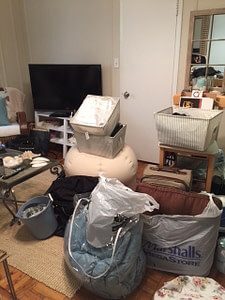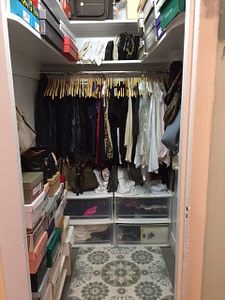Did you know that there’s a connection between clutter and weight?
Research shows that people who struggle with clutter were 77% more likely to be overweight or obese!
The Relationship between Clutter and Weight gain
It is believed that the relationship between clutter and weight gain is due to the rise in stress levels that comes along with living in this environment. Stress alters the way fat is deposited because of the specific hormones and other chemicals your body produces when you’re stressed.
For example, recent research shows that chronic stress stimulates your body to produce betatrophin – a protein that blocks an enzyme that breaks down body fat. (BBA Molecular and Cell Biology of Lipids February 2016: 1861(2); 130-137)
Further, stress-induced weight gain typically involves an increase in belly fat, which is the most dangerous fat for your body to accumulate because it increases your cardiovascular risk.
Clutter in your home or workspace can lead to feelings of overwhelm which may encourage you to overeat or to eating unhealthy food.
Often times we hold on to clutter for the same reasons we hold on to unwanted weight. Clutter is a buffer against the unknown. Excess weight is a mirror of the clutter in our environment.
Author Peter Walsh talks about different types of clutter. Walsh describes “memory clutter” as things that remind you of an important person, achievement or event, for instance. There is also clutter that people hold on to because they think they might need it one day.
This type of clutter is often based on fear and preparing for an imagined future.
Then there’s “lazy clutter” – the stuff that accumulates because you don’t take the time to get rid of it.
“It’s about balance – If you have so much stuff it drags you into the past or pulls you into the future, you can’t live in the present.”
In a study of 32 middle-class homes conducted by a team of archeologists, anthropologists and other scientists, mothers who described their homes as ‘messy’ or ‘cluttered’ also had higher levels of stress hormones by evening. (Life at Home in the Twenty-First Century July 2012)
Separate research also found women who described their homes as disorderly were more likely to suffer from depressed mood, fatigue in the evening, poor coping skills and difficulty transitioning from work to home. (Pers Soc Psychol Bull. 2010 Jan;36(1):71-81.)
A messy home or workspace can make it feel like it’s impossible to relax, and it greatly interferes with creativity and productivity.
Over the last 2 weekends I dove head first into my own closets to declutter and make way for abundance and the “new” in the New Year. I went through 20 years worth of “stuff” shoved in my closet. While I was decluttering I had my closets freshly painted.
I had to watch my mindset around what I wanted to hold onto and for what reasons. I knew once I got rid of whatever it was I would never miss it.
Below are a few photos of all I am donating to charity, my de-cluttering and my new organized closet.

I got rid of all the old papers, old paid bills, and clothes that I haven’t worn in years. I feel so much lighter all the way around. I feel so good when I walk into my closet now to get dressed. It’s clean and fresh feeling. And of course I ended up asking the age old question, “Why did I wait SO long to do that?”
If you’re ready to lose weight and feel lighter all the way around, schedule your call with me now.






